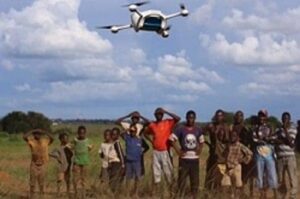 UNICEF has announced that, in conjunction with the Government of Malawi, it has begun testing the use of Unmanned Aerial Vehicles (UAVs) to explore cost effective ways of reducing waiting times for HIV testing of infants. The test, which is using simulated samples, will have the potential to cut waiting times dramatically, and if successful, will be integrated into the health system alongside others mechanisms such as road transport and SMS.
UNICEF has announced that, in conjunction with the Government of Malawi, it has begun testing the use of Unmanned Aerial Vehicles (UAVs) to explore cost effective ways of reducing waiting times for HIV testing of infants. The test, which is using simulated samples, will have the potential to cut waiting times dramatically, and if successful, will be integrated into the health system alongside others mechanisms such as road transport and SMS.
The first successful test flight completed the 10km route unhindered travelling from a community health centre to the Kamuzu Central Hospital laboratory. Residents watched as the vehicle took off and flew away in the direction of the hospital. The test flights which are assessing viability including cost and safety, will continue until Friday 18th March.
UAVs have been used in the past for surveillance and assessments of disaster, but this is the first known use of UAVs on the continent for improvement of HIV services.
“HIV is still a barrier to development in Malawi, and every year around 10,000 children die of HIV,” says Mahimbo Mdoe, UNICEF Representative in Malawi. “This innovation could be the breakthrough in overcoming transport challenges and associated delays experienced by health workers in remote areas of Malawi.”
“In 2014, nearly 40,000 children in Malawi were born to HIV positive mothers. Quality care of these children depends on early diagnosis, which requires taking dried blood samples from the health centre to the central laboratory for testing. We hope that UAVs can be part of the solution to reduce transportation time and ensure that children who need it, start their treatment early,” said Mdoe.
In 2014, around 10,000 children in Malawi died from HIV-related diseases and less than half of all children were on treatment. It currently takes an average of 11 days to get samples from health centre to a testing lab, and up to eight weeks for the results to be delivered back. The longer the delay between test and results, the higher the default rate of the patient.
Minister of Health Dr. Peter Kumpalume said the Malawi Government is committed to the prevention of mother to child transmission of HIV.
“Malawi has pioneered a number of innovations in the delivery of HIV services including the Option B+ policy which puts mothers on a simple, lifelong treatment regime. We have also pioneered the delivery of results from the central laboratory to the health facilities through text messages. We believe our partnering with UNICEF to test UAVs is another innovation and will help in our drive to achieve the country’s goals in HIV prevention and treatment.”


















